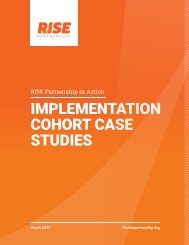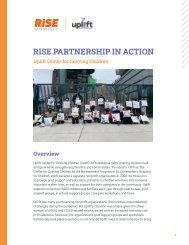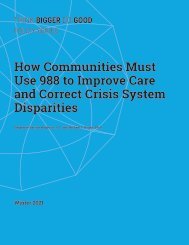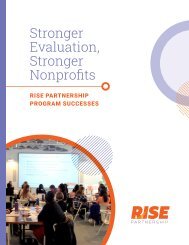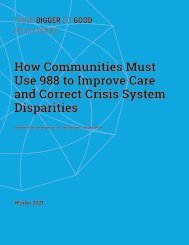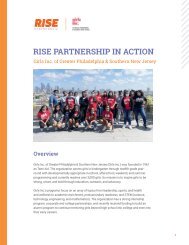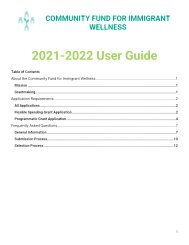Scattergood_IMD_Web
You also want an ePaper? Increase the reach of your titles
YUMPU automatically turns print PDFs into web optimized ePapers that Google loves.
who could be served in community settings is itself harmful, regardless of whether<br />
abuse occurs. As the Supreme Court observed in its Olmstead decision, needless<br />
institutionalization is a form of discrimination because “institutional placement of<br />
persons who can handle and benefit from community settings perpetuates unwarranted<br />
assumptions that persons so isolated are incapable or unworthy of participating in<br />
community life…and institutional confinement severely diminishes the everyday life<br />
activities of individuals” (7).<br />
Enforcement by the U.S. Department of Justice and private plaintiffs has resulted in<br />
Olmstead settlement agreements across the country that require states to offer sufficient<br />
assertive community treatment, supported housing, mobile crisis services, supported<br />
employment, and peer support services to avoid needless institutionalization in state<br />
psychiatric hospitals, psychiatric nursing facilities, adult homes, and other institutional<br />
settings. vi These settlements show that even today, there is significant overreliance on<br />
hospitals and other institutions that could be avoided with the development of community<br />
services. As the Senate Health, Education, Labor, and Pensions Committee observed<br />
several years ago, needless institutionalization remains widespread, including for<br />
people with mental illnesses (8).<br />
vi. See, for example, United States v. Georgia (state psychiatric hospitals; settlement approved 2010); United States v. Delaware<br />
(state psychiatric hospital and private <strong>IMD</strong>s; settlement approved 2011); United States v. North Carolina (privately operated<br />
adult care homes for individuals with mental illness; settlement approved 2012); United States v. New Hampshire (state psychiatric<br />
hospital and state nursing home for individuals with serious mental illness; settlement approved 2014); United States v. New<br />
York (adult homes for individuals with mental illness; settlement approved 2014); Disability Rights New Jersey v. Velez (state<br />
psychiatric hospitals; settlement approved 2009); Williams v. Quinn (privately operated <strong>IMD</strong> nursing homes in Illinois; settlement<br />
approved 2010); T.W. v. Carroll (state psychiatric hospitals; settlement approved 2015); Office of Protection and Advocacy v.<br />
Connecticut (privately operated nursing homes; settlement approved 2014); Napper v. County of Sacramento (individuals at<br />
risk of placement in psychiatric hospitals, emergency rooms, or psychiatric nursing homes due to community service cuts;<br />
settlement approved 2012); Katie A. v. Bonta (California foster care children with mental health needs in or at risk of placement<br />
in institutions; settlement approved 2011); and T.R. v. Quigley (Washington State children with mental health needs in or at<br />
risk of placement in institutions; settlement approved 2013).






